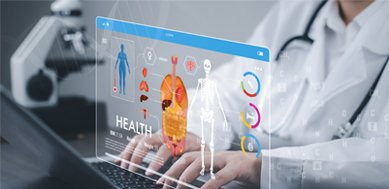- Appointment: 079875 35195
- Mon-Fri (10am - 6pm)
- drsiddhantj@gmail.com


Latest Advancements in Internal Medicine
Internal Medicine has always been a dynamic field, constantly evolving with scientific breakthroughs, medical innovations, and technological enhancements. Over the last few years, the specialty has witnessed significant advancements that have redefined how physicians diagnose, treat, and manage chronic and acute illnesses.
As an Internal Medicine and Family Physician at Medanta – The Medicity, Gurugram, I ensure that my clinical practice remains aligned with the latest developments. This not only helps deliver more accurate diagnoses but also enhances treatment outcomes and patient satisfaction.
Precision Medicine and Personalized Care
One of the most groundbreaking shifts in internal medicine is the rise of precision medicine. This approach tailors medical treatment based on an individual’s genetics, lifestyle, and environment. Unlike the traditional one-size-fits-all model, precision medicine allows for personalized plans, especially in managing conditions like diabetes, hypertension, and cardiovascular diseases.
With advanced diagnostic tools, we now understand how genes influence disease progression and drug response, enabling safer and more effective treatment choices.
Artificial Intelligence (AI) in Diagnostics
AI is transforming the internal medicine landscape by enhancing diagnostic accuracy and reducing human error. From interpreting lab reports to analyzing radiology images and predicting disease risk, AI supports clinical decision-making.
AI-powered tools can now detect early signs of chronic diseases, flag abnormal patterns, and even assist in triaging patients based on severity. This leads to quicker intervention and better outcomes.
Telemedicine and Remote Monitoring
The COVID-19 pandemic accelerated the integration of telemedicine, and it continues to play a vital role today. Patients can now consult physicians from the comfort of their homes, making care more accessible.
Additionally, remote patient monitoring (RPM) devices allow continuous tracking of vital signs like blood pressure, glucose levels, heart rate, and oxygen saturation. This ensures that patients with chronic diseases stay under close supervision without frequent hospital visits.
Advanced Point-of-Care Diagnostics
With certifications from institutions like Harvard Medical School, I use Point-of-Care Ultrasound (POCUS) and other bedside diagnostic tools that allow for immediate, accurate assessments in real-time.
These tools are especially valuable in emergency settings or for patients with respiratory issues, cardiac concerns, or abdominal pain. Early diagnosis translates into faster treatment and improved patient safety.
Integrated Chronic Disease Management
Internal medicine is increasingly adopting holistic, integrated care models. These models focus on managing multiple chronic diseases simultaneously rather than in isolation. For instance, patients with diabetes often have hypertension and dyslipidemia, requiring coordinated care.
At Medanta, we follow evidence-based guidelines to deliver multidisciplinary care, involving nutritionists, physiotherapists, and mental health experts as needed. This team-based approach ensures comprehensive disease control and better quality of life.
Advances in Infectious Disease Management
The pandemic also brought advancements in infectious disease monitoring, diagnosis, and vaccination. Innovations such as mRNA vaccine technology, rapid RT-PCR tests, and genomic sequencing have helped us respond swiftly to new pathogens.
Moreover, internal medicine specialists now rely on advanced antimicrobial stewardship programs to prevent antibiotic resistance—a growing concern worldwide.
Focus on Preventive Medicine
There is a renewed emphasis on preventive care. With growing awareness and access to health screenings, more individuals are opting for early risk assessment and lifestyle modification. As part of my clinical practice, I stress the importance of regular checkups, timely vaccinations, and screenings for conditions like diabetes, cardiovascular disease, and certain cancers.
Final Thoughts
The field of internal medicine is undergoing a revolution—driven by technology, patient-centric approaches, and scientific research. These advancements empower physicians to provide better care, faster recovery, and a more personalized experience for patients.
As a physician committed to staying at the forefront of medical progress, I ensure that my patients benefit from the latest and most effective healthcare strategies.
Your health deserves nothing less than the best of modern medicine—proactive, personalized, and precise.

